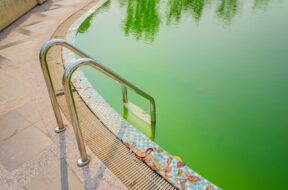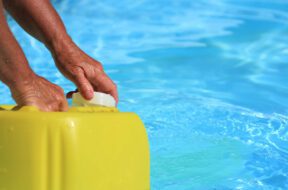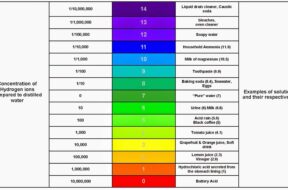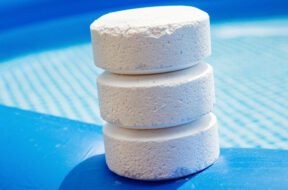
Want to learn more about algaecide? Read on to find out when to add algaecide to your pool maintenance routine and other helpful tips.
If you own a swimming pool, you’ve probably dealt with algae at one point or another during pool maintenance. It can appear on your pool wall, in your pipes and filter, on other pool surfaces, or free-floating in your pool water. Once algae crops up, it spreads quickly and can become a persistent problem. Not only is the aquatic, plant-like organism unpleasant to swim in, but it can also tint your pool water green and damage your pool and spa equipment.
But here’s the good news: If you’re trying to get rid of algae quickly and prevent it from returning, you’ve come to the right place. In this buying guide for the best pool algaecide, we’ll help you choose the right product based on your pool type, your budget, and your specific algaecide needs. We also recommend reading our guide on the best pool vacuum. You will want a good vacuum to help clean up any algae that sinks to the bottom of your pool.
There is an abundance of high-quality algaecide products on the market. Many of them are effective at killing and preventing almost every type of algae, including green algae, blue-green algae, mustard algae (also known as yellow algae), black algae, and less common types, such as pink algae.
When you shop for algaecide, you’ll see that the products contain various concentrations of one or more active ingredients. These chemicals include poly [oxyethylene (dimethyliminio) ethylene -(dimethyliminio)ethylene dichloride], which is often called polyquaternium WSCP, sodium bromide, and copper sulfate pentahydrate. Here’s our breakdown of the best algaecide products in each category.
For an all-purpose swimming pool algaecide, we recommend Kem-Tek 60% Algaecide Concentrate. This pool and spa algaecide contains 60% of its active ingredient, polyquaternium WSCP. It’s effective at removing most types of algae and preventing them from returning.
The presence of algae can cause green pool water, and this is the best algaecide not only for correcting it but for helping you achieve sparkling clear water. Kem-Tek algaecide is a non-foaming product, so that it won’t damage your pool surfaces. It’s suitable for use in chlorine and saltwater pools, hot tubs, and spas.
For inground pools, the best pool algaecide is No Mor Problems Preventative Algaecide from United Chemical. This non-foaming algae killer stands out for its convenience. As the name suggests, it can help with other pool issues in addition to getting rid of algae. When you use No Mor Problems, you might be able to cut down on how often you shock your pool, clean your filter, and scrub your pool walls. While it’s ideal for inground swimming pools, it can be used with any type of pool.
If you have a saltwater pool, your best bet is EasyCare PoolTec. This all-star algaecide that controls and prevents green algae, mustard algae, and black algae while delivering beautiful water clarity. Additionally, it’s designed to boost the effectiveness of chlorine in pools that use saltwater chlorinators. This algaecide is intended for weekly use, and you only need 4 ounces per 10,000 gallons of pool water. It’s also easy to use – all you have to do is pour it in, and you can dive in your pool right after treating it.
The costs of maintaining a pool can add up. If you’re on a budget, you might consider CLOROX Pool&Spa Green Algae Eliminator, which is priced much lower than most other algaecides for pools. It instantly kills algae and inhibits future growth. While the CLOROX Pool&Spa algaecide is formulated to target green algae, it’s effective at eliminating other kinds as well. The non-foaming formula can be used in all types of swimming pools, including saltwater pools. With weekly use, you’ll be able to keep algae at bay and maintain clean and clear water.
Many algaecides are most effective with weekly use, but if you’d like to save time and treat your pool for algae less often, we recommend PoolRx Mineral Unit 6-Month Algaecide. This product comes in a few different sizes, and you can select the proper one based on the gallon volume of your pool.
With PoolRx, you’ll get pre-portioned units. Each PoolRx algaecide unit contains chelated minerals that are tough on algae and gentle on your pool. The mineral content dissolves from the unit once it’s in the water and then forms a residual (a low level of mineral content remaining in water after initial use).This continuously inhibits algae growth for up to six months, which will save you both time and money.
Most algaecide products are designed to kill and deter algae, but some are better at inhibiting growth than others. The best pool algaecide for preventing the growth of algae spores is the 90-Day Algae Prevention & Remover for Pools from SeaKlear. The highly concentrated algaecide gets rid of green, blue-green, and mustard algae, as well as tough-to-combat black algae in all types of pools.
You can count on the reliable formula to keep your pool water clear and safe for swimming. Although it doesn’t last quite as long as PoolRx, SeaKlear is guaranteed to keep algae away for up to 90 days, which is much longer than most algaecides. This non-foaming, copper-based algaecide won’t stain your pool walls, liner, or surrounding surfaces.
Lotion, soap, oil, and other contaminants can cause foamy water in swimming pools; this is unappealing for swimming, and can also damage your pool equipment. Certain algaecides can also contribute to foaming in jetted pools, spas, or hot tubs. Many algaecides on the market don’t foam up when they come into contact with pool water. That said, our pick for the best non-foaming algaecide for pools is BioGuard Algae Complete.
The dual-action formula contains both polyquaternium WSCP and copper sulfate pentahydrate. This fast-acting copper algaecide is an impressive product. One treatment will destroy any existing black, mustard, and green algae in your pool, and with weekly use, you won’t have to worry about regrowth. Additionally, it can work in conjunction with almost any other swimming pool sanitizer. BioGuard Algae Complete is not only non-foaming but also non-staining, so you won’t have to worry about the color of your pool walls, enclosure, or the surrounding area.
Black algae is similar to other kinds of algae in that it contains chlorophyll, but it also contains cyanobacteria (a type of aquatic bacteria). This darkens the color, making it appear black. This type of algae grows in colonies and can be dangerous if left untreated. When cyanobacteria blooms, it can be toxic for swimmers.
Unlike other forms of algae, black algae is particularly challenging to get rid of – but it’s usually possible with the right treatment. So what’s the best algaecide for black algae? ProTeam Polyquat Algaecide is a top-rated product for treating and inhibiting hard-to-kill algae. As the name suggests, its active ingredient is polyquaternium WSCP. In addition to black algae, the highly concentrated formula is effective at preventing and removing mustard and blue-green algae.
This non-foaming algaecide is a non-metallic product. With weekly treatments, you might be able to cut down on your liquid chlorine use. Plus, you’ll notice clearer pool water the first time you use it. With Polyquat Algaecide, a little bit goes a long way. You’ll only need to use 2 to 4 ounces per 10,000 gallons of water.
At Pool Calculator, we’re dedicated to helping you keep your pool water safe, healthy, and crystal clear. Shocking your water and treating it with chlorine are vital aspects of pool maintenance – and in many instances, regular algaecide treatment is also necessary. It’s important that you educate yourself on the best pool shock and chlorine before buying the chemicals and starting the process.
If your pool has an algae problem, you’ll probably be able to see it. But what you can’t see is the chemical imbalance that allowed it to grow in the first place. To prevent algae from occurring in your swimming pool, it’s essential to find the best pool test kit to test your water chemistry frequently and balance it as needed.
With the Pool Calculator app, you’ll have everything you need at your fingertips to maintain clean, healthy, and balanced swimming pool water. After testing your water, just drop your chemical ranges into the app to see where you stand in terms of your pH levels, total alkalinity, free chlorine, total chlorine levels, cyanuric acid, and calcium hardness. Ready to get started? Get the Pool Calculator app on your desktop, Android, or iOS mobile device now!
Sources:
https://www.thespruce.com/pool-cleaning-algae-colors-types-2736565
https://www.sciencedaily.com/releases/2017/01/170110151354.htm
https://www.hunker.com/13417954/how-to-add-copper-sulfate-to-pools
https://ucmp.berkeley.edu/bacteria/cyanointro.html

Want to learn more about algaecide? Read on to find out when to add algaecide to your pool maintenance routine and other helpful tips.

In this quick guide, we’ll answer the question “can you over shock a pool” and unveil the factors to consider when shocking a pool.

Maintaining both pH and total alkalinity in your swimming pool is important for keeping your pool properly sanitized and non-corrosive. Total alkalinity is to pH what cyanuric acid is to free chlorine. Total alkalinity stabilizes pH levels. The ideal pool pH level is 7.4 to 7.6. The ideal total alkalinity level is 80 to 120 ppm.

The Association of Pool and Spa Professionals recommends free chlorine levels for both swimming pools and hot tubs be kept between 2.0 and 4.0 ppm. However, the Center for Disease Control recommends free chlorine stay above 1 ppm in pools and 3 ppm in hot tubs.